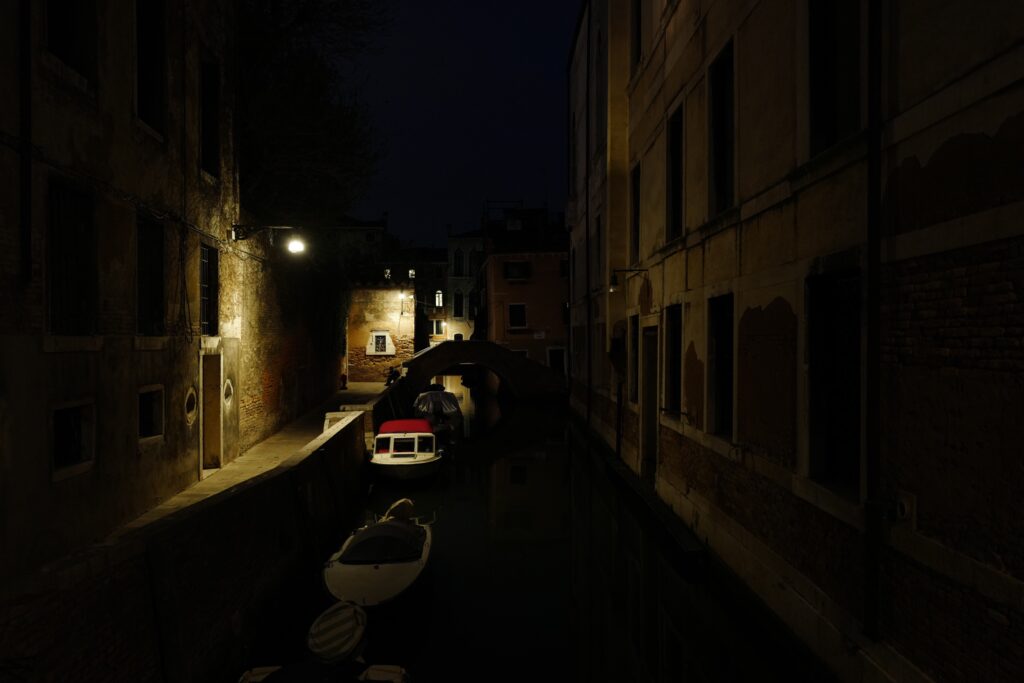Evening in Venice

Quote of the Day
“An economist is an expert who will know tomorrow why the things he predicted yesterday didn’t happen today.”
- Laurence Peter
Musical alternative to the morning’s radio news
Liam O’Flynn | Newfoundland | From Shaun Davey’s The Brendan Voyage
Since we are all embarking on a voyage through unknown waters in 2022 I thought it might be appropriate to find music that celebrates a successful voyage into similarly unknown waters. This piece is the tenth movement of a landmark work composed by Shawn Davey in 1980 — the first musical meeting between two musical traditions — one represented by an Irish uilleann piper; the other — the classical tradition — represented by a symphony orchestra.
Davey composed the work to mark explorer Tim Severin’s epic voyage across the Atlantic in a leather boat, a replica medieval voyage which set out to prove that it was possible that the 6th century Irish Saint, Brendan, may have reached America before Columbus or the Norsemen. The voice of the medieval boat is represented by the uilleann pipes of Liam O’Flynn, the greatest piper of my lifetime, while the orchestra represents the Atlantic. And the piece marks the culmination of the voyage — the landing in Newfoundland.
Long Read of the Day
Zadie Smith on Joan Didion
Predictably, there have been lots and lots of articles, essays and obits of her, but the very best I’ve found so far is Zadie Smith’s piece in the New Yorker. A few samples:
Magical thinking is a disorder of thought. It sees causality where there is none, confuses private emotion with general reality, imposes—as Didion has it, perfectly, in “The White Album”—“a narrative line upon disparate images.” But the extremity of mourning aside, it was not a condition from which she generally suffered. Didion’s watchword was watchword. She was exceptionally alert to the words or phrases we use to express our core aims or beliefs. Alert in the sense of suspicious. Radically upgrading Hemingway’s “bullshit detector,” she probed the public discourse, the better to determine how much truth was in it and how much delusion. She did that with her own sentences, too.
Or
Whether writing about the invention of “women as a ‘class,’ ” Haight-Ashbury, John Wayne, the death of her family, or her own mental breakdown, Didion’s target was the “psychic hardpan.” This she located just beneath the seemingly rational or ideological topsoil, which she found to be “dense with superstitions and little sophistries, wish fulfillment, self-loathing and bitter fancies.” That she is considered a personal essayist is another one of those literary ironies: even when the subject was Didion, she was still reporting, and no more likely to be sympathetic to her own feelings than to those of Joan Baez, Nancy Reagan, or a kid on acid. She was just another subject among many, prone to the petty delusions of all humans but—crucially—genuinely interested in drilling down into that hardpan, no matter what she might find down there. She wasn’t looking for approval.
Whatever about magical thinking, this is magical writing. Do read it.
How history repeats itself in tech
Yesterday’s Observer column:
The tech companies saw this coming, of course, and it was eerie to see how their responses echoed the playbooks of the tobacco and energy companies of an earlier period, as chronicled, for example, by Naomi Oreskes and Erik Conway in their 2010 book, Merchants of Doubt: How a Handful of Scientists Obscured the Truth on Issues from Tobacco Smoke to Global Warming. The other day, Andrew Bosworth, the incoming chief technology officer of Meta (neé Facebook) was asked whether he thought “vaccine hesitancy would be the same with or without social media”. His reply, verbatim, reads: “I think Facebook ran probably the biggest Covid vaccine campaign in the world. What more can you do if some people who can get that real information from a real source choose not to get it? That’s their choice. They’re allowed to do that. You have an issue with those people. You don’t have an issue with Facebook. You can’t put that on me.”
Sounds familiar? It’s what oil companies came up with when they invented the idea of the “carbon footprint” – ie your footprint on the biosphere, not theirs. It’s the displacement of responsibility strategy: since it’s a free country, nobody’s forcing you to do the thing that’s bad for you. Childhood obesity is the responsibility of the child or of his or her parents. Alcoholism happens because you don’t “drink responsibly”. Radicalisation of the mass shooter is not YouTube’s responsibility. It’s always your fault, not that of the manufacturer of the addictive product.
Do read the whole thing.
Saturday was Public Domain Day, 2022
 The annual post from the wonderful Duke Centre for the Study of the Public Domain reminded us that,
The annual post from the wonderful Duke Centre for the Study of the Public Domain reminded us that,
On January 1, 2022, copyrighted works from 1926 enter the US public domain, where they will be free for all to copy, share, and build upon. The line-up this year is stunning. It includes books such as A. A. Milne’s Winnie-the-Pooh, Felix Salten’s Bambi, Ernest Hemingway’s The Sun Also Rises, Langston Hughes’ The Weary Blues, and Dorothy Parker’s Enough Rope. There are scores of silent films—including titles featuring Harold Lloyd, Buster Keaton, and Greta Garbo, famous Broadway songs, and well-known jazz standards. But that’s not all. In 2022 we get a bonus: an estimated 400,000 sound recordings from before 1923 2 will be entering the public domain too!
Given that Winnie the Pooh is a multi-billion dollar franchise, imagine the conference-room full of expensive IP lawyers in Disney HQ wondering how to stop what happens next.
And of course, Xi Jinping’s legal retainers will also be busy, given that images of Pooh Bear are banned in China since (for some unknown reason) they remind people of the great leader.
This Blog is also available as a daily email. If you think that might suit you better, why not subscribe? One email a day, Monday through Friday, delivered to your inbox. It’s free, and you can always unsubscribe if you conclude your inbox is full enough already!
